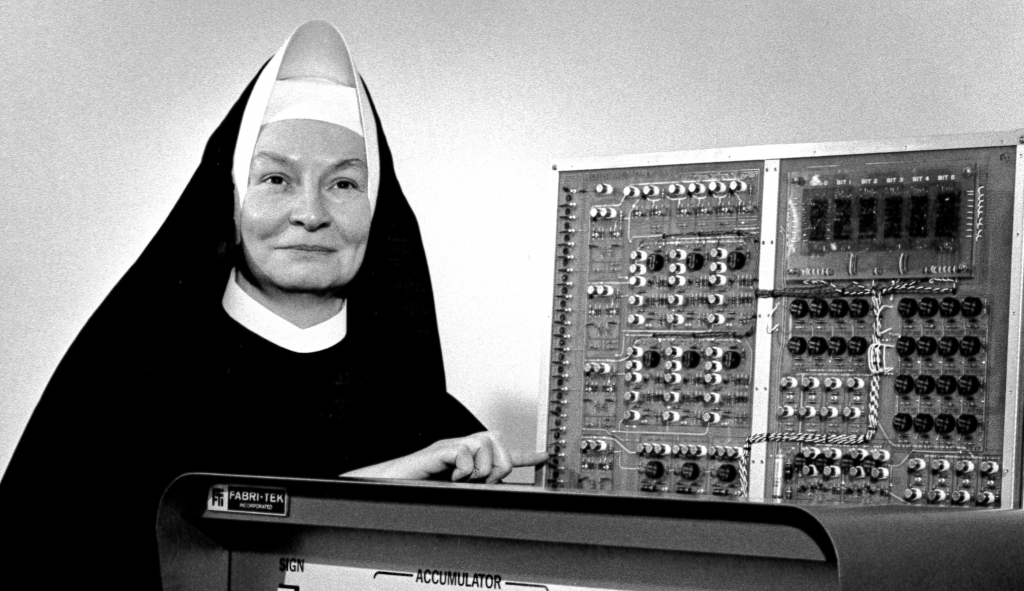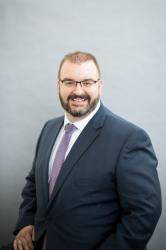Emerging from the vibrant and innovative postwar years, the nascent discipline of computer science in America was attracting top talent in mathematics, engineering, and computational linguistics. Several schools were creating “computer science” programs by the 1950s and early ’60s. In fact, the first ever doctoral degrees in this emerging discipline were awarded on the very same day, June 7, 1965. The first, a D.Sc. in applied mathematics and computer science, was awarded to Irving C. Tang at Washington University, St. Louis. The second, just a few hours later and a few hours north, to a 51-year-old Roman Catholic nun named Sr. Mary Kenneth Keller, who earned a Ph.D. in computer science from the University of Wisconsin-Madison. While Tang went on to have a career primarily focused on mathematics, Sr. Mary Kenneth Keller was born before her time, becoming an innovator in the fields of computer science research, mathematics, and higher education.
Born Evelyn Keller in Cleveland, Ohio, on December 17, 1913, not much is known about her early years other than that she spent most of her youth in Chicago, raised by parents who never advanced beyond the eighth grade. Evelyn had the privilege of graduating from The Immaculata High School in the Lakeview neighborhood of Chicago in 1931, concentrating in English and journalism. In 1932, at the age of 18, she took her vows in a religious order called the Sisters of Charity of the Blessed Virgin Mary and changed her name to Mary Kenneth Keller. In addition to making this life-changing commitment, she managed to take college courses from two different BVM schools (Clarke College and Mundelein College), all while teaching at the elementary school level. She eventually graduated from DePaul University in 1943, excelling in mathematical sciences. This allowed her to begin teaching high school, where she dedicated the next 18 years of her life. Over the next few years, Sr. Mary Kenneth continued to develop a love for mathematics, but owing to her regular teaching schedule, she had to work her way slowly through summer classes, starting in 1946, finally graduating in 1952 with a 30-credit M.S. in mathematics from DePaul University.
While dabbling in further graduate education at multiple schools, it was her acceptance to a summer program for high school teachers at Dartmouth College in 1961 that introduced her mathematical mind to the power of computers. Dartmouth was a hotbed of innovative thinking in computer science at the time. Just five years earlier, the term “artificial intelligence” was coined at a Dartmouth summer workshop on formal logic by John McCarthy and Marvin Minsky. It was in this soil that Sr. Mary Kenneth, in her late 40s, was able finally to grow in her primary educational calling, computer programming. She had the privilege of studying with Thomas Kurtz, the father of the BASIC programming language. It needs to be mentioned here that many outlets claim Keller helped develop BASIC programming, but that is an error; she studied with the creators of it but did not have a hand in its development. (It wasn’t even released until May 1964.) That being said, she became one of the programming language’s most proficient teachers, even co-writing a prominent textbook on the subject in 1973.
Her time at Dartmouth oriented the rest of her life. As she put it, “I just went out to look at a computer one day, and I never came back. … It looked to me as if the computer would be the most revolutionary tool for doing math that I could get.” It was Sr. Mary Kenneth’s prescient vision for the increasing role that computers would play in the everyday lives of students that got her tapped by Mary Benedict Phelan, BVM, president of Clarke College, to start a Ph.D. at the University of Wisconsin-Madison in 1962. It was in her doctoral studies that she branched out into issues of automation and computer language training. “She wanted to demonstrate that algorithms could perform tasks like differentiation through learning-by-example, rather than by a rule-based process,” note the authors of an essay appearing in IEEE Annals of the History of Computing. “Although this approach was out of favor for many years, it has recently had a renaissance in so-called ‘deep learning models’ in artificial intelligence and now dominates the field.”
Sr. Mary Kenneth’s persistent love and dedication to the subject finally paid off, and after 29 years teaching elementary and high school students, she completed one of the first terminal degrees in the field at the age of 51. She stayed at Clarke College for the next 20 years, creating and chairing the computer science department (a first at the small, private level), passing along her vision to the students of a future that would be dominated by the computer. She was also a consistent and vocal advocate for women in the sciences, allowing young mothers to bring their babies to class as they learned to work on some of the finest computers money could buy.
Sr. Mary Kenneth was also a sought-after speaker, and she poured all the money she earned in these endeavors back into the computer labs and research opportunities for her students. One of the many innovations she brought to the classroom was the integration of cross-disciplinary uses of computer programming. She was prophetic in the way libraries would use similar programs to specialize in information retrieval. Research would eventually become easier given the enhanced access to information, and she advocated for the democratizing effect of having information available to everyone, not just computer scientists.
Sr. Mary Kenneth’s final decade was spent creating new research paths for nonspecialists, including adult education classes in the evening, and speaking and consulting widely to the effect that society would benefit if it fully embraced the computer revolution. When she retired, she had created not only a new department at Clarke but also a flourishing master’s degree program that continued to produce top tier graduates.
Even in the nursing home in which she spent her last days, Sr. Mary Kenneth had a top-of-the-line computer in her bedroom, which she used to help streamline issues at the facility as well as to teach others the benefits of computer literacy.
Sr. Mary Kenneth Keller, evangelist, visionary, educational role model, died on January 10, 1985. Till the very end, she embraced the beautiful watchword she had hung in her office: “My life is a continuing changing awareness of God’s will for me.”

